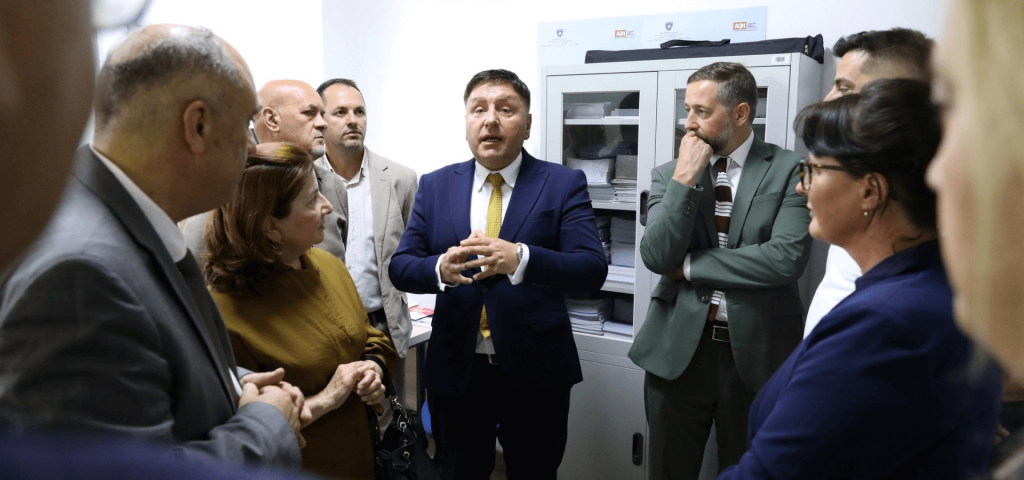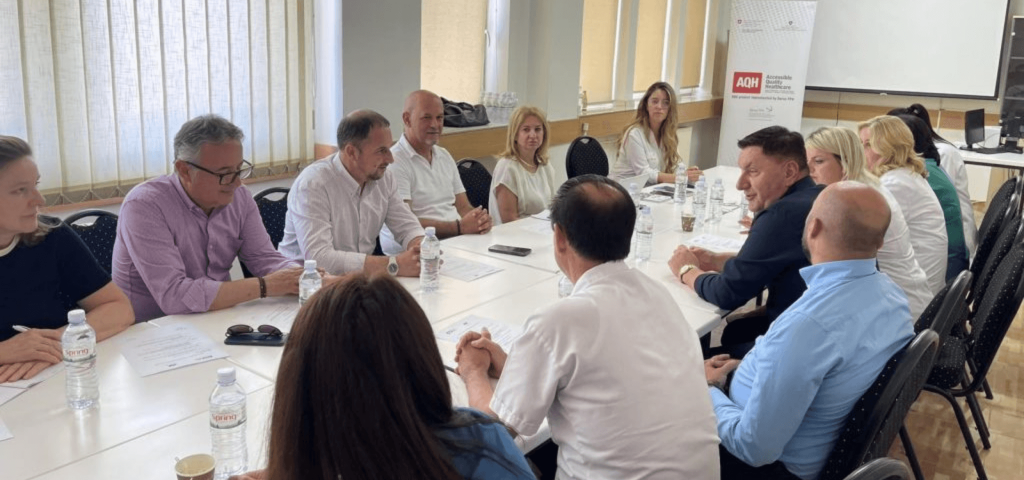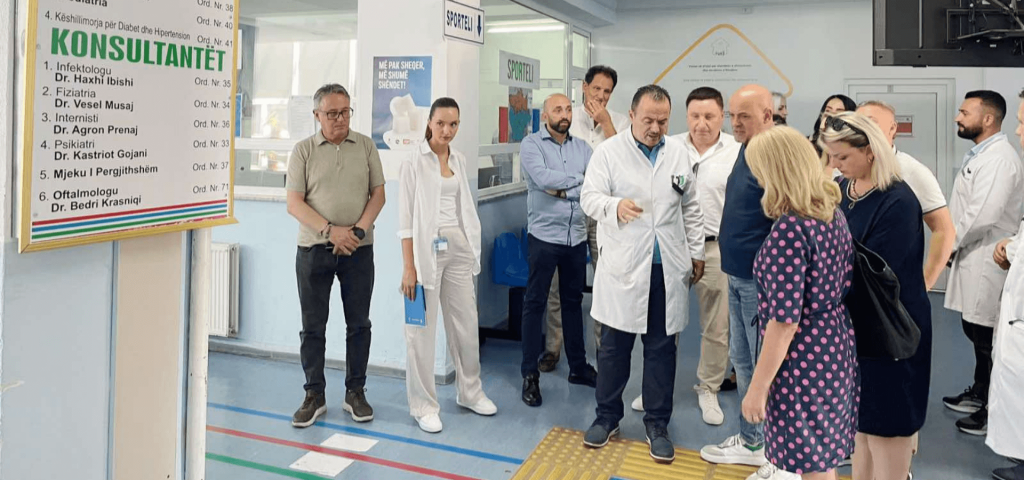As the Accessible Quality Healthcare (AQH) project entered its final phase, a new approach to scaling interventions is redefining how sustainable healthcare interventions take root across the country. The project has adopted a demand-driven method, empowering health managers across all municipalities in Kosovo to identify, prioritize, and implement project supported interventions with a focus on non-communicable diseases.
The On-Demand mechanism is established as a tool of the Working Group of the Ministry of Health on May 2024, formally known as Ad-Hoc Working Group. The group brings together representatives from the Ministry of Health, the Collegium of Municipal Directorates of Health and Social Welfare (CDHSW), AQH Project and other relevant actors. Together, they are supporting the continuous improvement of primary healthcare in Kosovo, building on the principles of local ownership, peer learning, and alignment with national priorities.
“The group plays an important role in monitoring progress, building capacities, and helping turn successful practices into long-term improvements that benefit the entire healthcare system across Kosovo,” explained Naim Bardiqi, General Secretary of Ministry of Health in Kosovo.
This approach is now at the core of the scale-up process. From the most experienced municipalities, including the project’s demonstration sites, to the newly appointed ones, it enables everyone to build on what works, learn from each other, and expand the project’s reach nationwide.
“The On-Demand mechanism ensures interventions are tailored and focused on real needs,” says Linda Mulolli, AQH Project Consultant, who has been facilitating the experience exchanges among municipalities within the CDHSW. “It enables municipalities to identify and select the activities that make the most sense for their communities.’’
From project implementation to municipal ownership

The first meeting of the Ad-Hoc Working Group took place in June 2024, launching a process that is now a key part of AQH’s scale-up strategy. The group reviews proposals from municipalities, focusing on feasibility and alignment with national health goals.
“The Ad-Hoc Working Group and the process of expanding to new municipalities help the Ministry of Health ensure that AQH interventions scale up in a well-coordinated way, align with national priorities, and support the broader plans for strengthening Primary Healthcare,” said Mr. Bardiqi.
The Ministry views this process as a step toward a more structured and results-oriented approach to scaling efforts in primary healthcare.
“The Ministry of Health remains committed to continuing the work of the Ad-Hoc Working Group by integrating it within the framework of national planning for the development and strengthening of Primary Health Care… Through this group, the Ministry aims to ensure continuous monitoring of progress in health policy implementation, strengthen cooperation with municipalities, and advance efforts to incentivize performance in Primary Health Care through performance-based payment mechanisms,” said Mr. Bardiqi.
From project implementation to municipal ownership

One of the impacts of the scale-up process has been the active role of the CDHSW, which functions under the Association of Kosovo Municipalities (AKM). The Collegium has become a valuable space for communication, coordination, and capacity building among municipal health directors across the country.
Through regular meetings, site visits, and workshops, both experienced and new municipalities are learning from one another. New municipalities see firsthand how interventions work in practice, including chronic disease counseling and the use of Health Education and Promotion Rooms.
“Municipalities that had already implemented AQH-supported interventions were able to guide and inspire those newly engaged under AQH III,” says Mulolli.
Until 2024, AQH has supported 20 municipalities, covering around 50% of Kosovo’s population. In its third and final phase, all 38 municipalities in Kosovo are invited to be part of the project through the OnDemand Mechanism. So far, 14 additional municipalities have formally requested and are receiving support.
Lipjan, one of AQH’s demonstration sites, is actively involved in peer learning. As some services are still being established in newly engaged municipalities, learning from peers has become a key component of the On-Demand Mechanism.
“We believe it’s very important for experienced municipalities like Lipjan to share their practices”, emphasized Agim Krasniqi, Director of the Main Family Medicine Center in Lipjan. “Through these visits, participants are now more able to implement similar interventions, especially when it comes to chronic disease education and community outreach.”

Vitia, a newly involved municipality has already begun applying insights from these exchanges to strengthen their own interventions.
“After visiting Lipjan, we immediately began working on our own Health Education and Promotion Room,” said Vjollca Kadolli –Halili, Director of the Main Family Medicine Center in Vitia.“Seeing the setup in [Lipjan] and talking to the staff helped us understand how to adapt it to our context.”
Since the visit, Vitia has since also co-financed and implemented a Quality Improvement Project, increasing the quality of emergency services, patient flow and Continued Professional Development activities.
These site visits offer more than just technical information, they provide a picture of what is possible, even in settings with limited resources. Municipal health workers walk through functional Health Promotion and Educational Rooms, observe patient engagement techniques, and speak directly with local nurses and doctors about what works, and what doesn’t.
By showing how services are integrated into daily operations, experienced municipalities like Lipjan help build trust and motivation among visiting teams. This encourages them to take concrete steps to improve services in their own communities.
Building together a healthier Kosovo
Since the establishment the Working Group, AQH has carried out a range of activities, including field visits to new municipalities. These visits introduced the project and its goals, and gave management teams a chance to express their interest in specific interventions.
What sets the On-Demand mechanism apart is its shift in roles. Instead of municipalities waiting to be selected for a project or assigned an intervention, they are now initiating the process, based on their own planning, priorities, and readiness. While AQH will continue to support this scale up the led role is in the hands of municipalities. This helps ensure sustainability and that successful interventions continue even after the project ends.
AQH Project is funded by Swiss Development Cooperation and implemented by the Swiss Tropical and Public Health Institute



